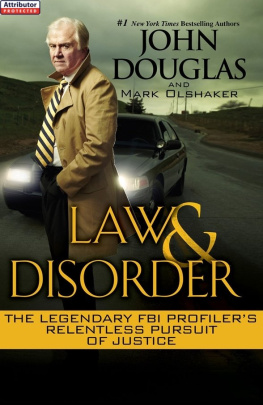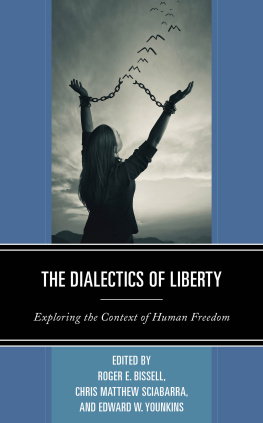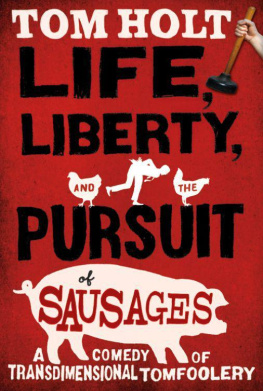Roger Douglas - Law, Liberty, and the Pursuit of Terrorism
Here you can read online Roger Douglas - Law, Liberty, and the Pursuit of Terrorism full text of the book (entire story) in english for free. Download pdf and epub, get meaning, cover and reviews about this ebook. year: 2018, publisher: The University of Michigan Press, genre: Politics. Description of the work, (preface) as well as reviews are available. Best literature library LitArk.com created for fans of good reading and offers a wide selection of genres:
Romance novel
Science fiction
Adventure
Detective
Science
History
Home and family
Prose
Art
Politics
Computer
Non-fiction
Religion
Business
Children
Humor
Choose a favorite category and find really read worthwhile books. Enjoy immersion in the world of imagination, feel the emotions of the characters or learn something new for yourself, make an fascinating discovery.
- Book:Law, Liberty, and the Pursuit of Terrorism
- Author:
- Publisher:The University of Michigan Press
- Genre:
- Year:2018
- Rating:5 / 5
- Favourites:Add to favourites
- Your mark:
- 100
- 1
- 2
- 3
- 4
- 5
Law, Liberty, and the Pursuit of Terrorism: summary, description and annotation
We offer to read an annotation, description, summary or preface (depends on what the author of the book "Law, Liberty, and the Pursuit of Terrorism" wrote himself). If you haven't found the necessary information about the book — write in the comments, we will try to find it.
Law, Liberty, and the Pursuit of Terrorism — read online for free the complete book (whole text) full work
Below is the text of the book, divided by pages. System saving the place of the last page read, allows you to conveniently read the book "Law, Liberty, and the Pursuit of Terrorism" online for free, without having to search again every time where you left off. Put a bookmark, and you can go to the page where you finished reading at any time.
Font size:
Interval:
Bookmark:
 Page xiii
Page xiii | AGC | assistant general counsel |
| ASIO | Australian Security Intelligence Organisation |
| ASIO Act | Australian Security Intelligence Organisation Act 1979 (Cth) |
| CAA | Crimes Act 1914 (Cth) |
| CAE | Canada Evidence Act RSC 1985, c C-5 |
| CAU | Communications Analysis Unit (FBI) |
| CBRN | chemical, biological, radiological, and nuclear |
| CCC | Criminal Code of Canada RSC 1985, c C-41 |
| CIPA | Classified Information Procedures Act of 1980, PL 96456, 94 Stat 2015, codified at 18 USC App |
| CPR | Civil Procedure Rules 1998 (UK), SI 1998/3132 |
| CSIS | Canadian Security Intelligence Service |
| CSRT | Combatant Status Review Tribunal |
| Cth | Commonwealth of Australia |
| ECHR | European Convention for the Protection of Human Rights and Fundamental Freedoms |
| ECtHR | European Court of Human Rights |
| FISA | Foreign Intelligence Surveillance Act of 1978, PL 95511, 92 Stat 1783, codified at 50 USC Ch 36 |
| FISC | Foreign Intelligence Surveillance Court |
| IEEPA | International Emergency Economic Powers Act of 1977, PL 95223, 91 Stat 1628, codified at 50 USC Ch 35 |
| IRPA | Immigration and Refugee Protection Act, SC 2001, c 27 |
| NSIA | National Security Information (Criminal and Civil Proceedings Act 2004 (Cth) |
| NSL | national security letter |
| NSLB | National Security Law Branch |
| NZSIS | New Zealand Security Intelligence Service |
| OPR | Office of Professional Responsibility (Department of Justice) |
| PIRA | USA Patriot Improvement and Reauthorization Act of 2005, PL 109177, 120 Stat 192 Page xiv |
| POAC | Proscribed Organisations Appeals Commission (Procedure) Rules 2001 (UK), SI 2001/1286 |
| RIPA | Regulation of Investigatory Powers Act 2000 (UK), c 23 |
| SIAC | Special Immigration Appeals Commission Act 1997 (UK), c 68 |
| TA | Terrorism Act 2000 (UK), c 11 |
| T(IA)A | Telecommunications (Interception and Access) Act 1979 (Cth) |
| Torture Convention | Convention against Torture and Other Cruel, Inhuman or Degrading Treatment or Punishment 1465 UNTS 85 |
| TSA | Terrorism Suppression Act 2002 (New Zealand) |
| USAPA | USA Patriot Act of 2001, PL 10756, 115 Stat 272 |
Reports that say that something hasn't happened are always interesting to me, because as we know, there are known knowns; there are things we know we know. But there are also unknown unknownsthe ones we don't know we don't know. And if one looks throughout the history of our country and other free countries, it is the latter category that tends to be the difficult ones.
Donald H. Rumsfeld
Many of you may have seen recent press reporting about asurvey that found people are now much less concerned about terrorism than they were after the London bombings. The decrease in public concern about terrorism, at one level, is not surprising. Public attention spans are often short and Australians tend to have an optimistic perception of the security environment. Over the last five years, the issue of terrorism has rarely been far from centre-stage in the media, but Australia has not experienced a recent attack on its soil. So it is almost inevitable that a type of terrorism fatigue, if you will, would set in. Unfortunately, such complacencymakes us vulnerable.
Paul O'Sullivan, director-general of the Australian Security Intelligence Organization, 2006
Civil libertarian critiques of responses to terrorism frequently assume that counterterror polices are distorted by exaggerated assessments of the seriousness of the terrorist threat, especially in the aftermath of spectacular terrorist attacks. This conclusion is defended partly on the basis of theory and partly on the basis of evidence suggesting that estimates of the threat are unwarranted by what is known about its true magnitude and that this is particularly likely immediately following terrorist attacks. This chapter develops and examines these arguments. It concludes that they are cogent but not conclusive. They depend on the optimistic assumption that the objective terrorist threat will continue to be slight, and while that assumption may be warranted, one cannot be certain of it. While poll data yields evidence of cognitive error, it also yields evidence to suggest that the political salience of the threat is small, notwithstanding that the perceived risk remains high.
When people form opinions about the risk of terrorist attacks, they necessarily do so in a state of considerable ignorance as to terrorists' intentions. They Page 13 are thrown back on a variety of cognitive shortcuts. One is known as availability (the ease with which instances or associations can be brought to mind). Typically, frequent events are more available than infrequent ones, but what terrorism lacks in frequency is made up by its visibility, reinforced by television footage of the aftermath of terrorist attacks in foreign countries and by periodical replays of the collapsing towers in New York, the red London bus with its top sheared off, or the smoke billowing from the Taj Mahal hotel in Mumbai. Given the generally accepted trope that terrorists aim for drama, their success will be reflected in an overassessment of the risk they pose. Availability will be highest immediately following terrorist attacks on symbols with which one can identify, but memories are likely to persist long after the attack.
Perception of low-risk high-intensity threats is also likely to be distorted by worst-case fears (which become serious when compounded with failure to discount for improbability). Worst-case reasoning shares something in common with availability. Actual very bad cases stand out more than not-so-bad ones, and warnings of worst cases are likely to receive more publicity than warnings of minor attacks. Worst-case reasoning is aggravated by the difficulties most people have with probabilities. As probabilities decrease, people find it increasingly difficult to distinguish between the implications of small and very small probabilities, and they make their assessment of the danger on the basis of the nature of the threatened outcome rather than on its likelihood. Sunstein reports studies finding that perceptions of riskiness do not vary when the risk is 1/100,000 rather than 1/1,000,000 and that perceptions even vary little between risks of 1/650, 1/6,300, and 1/68,000. Assume that an honest and infallible oracle has helpfully provided the information that within a given country and a given period, there is a 1/1,000,000 chance of a terrorist attack, which, if it takes place, will kill 100,000 people and cost $500 billion in property damage. A coldhearted insurer would require a premium based on the value of a tenth of a life and aggregate premiums of a little more than $500,000 to insure against the risk. But the risk assessor in the street would assess the risk at a considerably higher level. This suggests that perceptions of the threat of terrorism may be heavily influenced by remote possibilities of really serious attacks.
Moreover, even after controlling for the objective seriousness of the threat, people appear to be willing to pay far more to reduce the likelihood of a threat from 1 percent to zero than they are to reduce it from 2 to 1 percent. Where the threat also arouses a high level of emotion, the price people are willing to pay for its elimination is even higher, and it is also even less dependent on perceived probabilities. Given that terrorism involves low probabilities and that the threat is likely to arouse strong emotions, one would expect Page 14 that even small threats would be accompanied by willingness to make considerable sacrifices in order to minimise or eliminate the likelihood of their eventuating.
Next pageFont size:
Interval:
Bookmark:
Similar books «Law, Liberty, and the Pursuit of Terrorism»
Look at similar books to Law, Liberty, and the Pursuit of Terrorism. We have selected literature similar in name and meaning in the hope of providing readers with more options to find new, interesting, not yet read works.
Discussion, reviews of the book Law, Liberty, and the Pursuit of Terrorism and just readers' own opinions. Leave your comments, write what you think about the work, its meaning or the main characters. Specify what exactly you liked and what you didn't like, and why you think so.

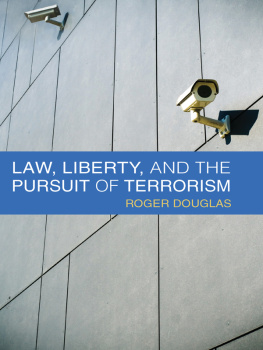



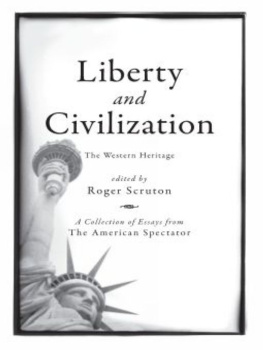

![Roger G. Miller - Like A Thunderbolt: The Lafayette Escadrille And The Advent Of American Pursuit In World War I [Illustrated Edition]](/uploads/posts/book/291189/thumbs/roger-g-miller-like-a-thunderbolt-the-lafayette.jpg)
